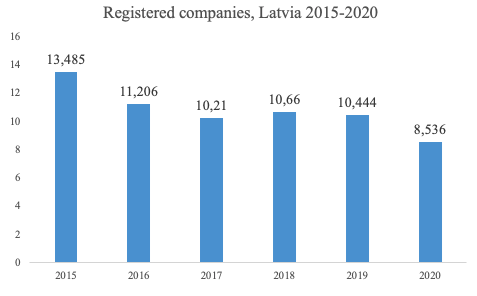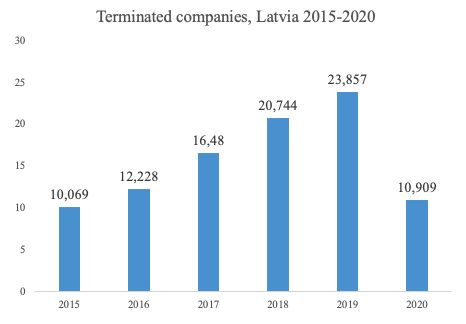Weekly Briefing, Vol. 35, No. 2 (LVA), December 2020
Key Economic Indicators Changes in the Covid-19 Crisis Situation
Introduction
Latvian economy in 2020 has faced significant difficulties due to Covid-19 crisis. However, due to governmental support measures and conscious behaviour of society the consequences are less than they could be. In this briefing the main outcomes of this year are analysed and compared to the previous year and situation in Europe in general. Key indicators of economic development, which are considered and analysed are the following:
- Gross domestic product rate (GDP);
- Wages and salaries level;
- Expenditure approach;
- Unemployment rate;
- Business environment situation.
- GDP changes in 2020
Data compiled by the Central Statistical Bureau (CSB) shows that in the 3rd quarter of 2020, compared to the 3rd quarter of 2019, gross domestic product (GDP) decreased by 2.6 %.[i] Over the nine months of 2020 GDP has reduced by 4.3%. GDP decrease in Latvia corresponds to the GDP fall in Europe as compared with the same quarter of the previous year, GDP decreased by 4.3% in the EU in the third quarter of 2020.[ii]
The most affected by Covid-19 sector is transport and storage sector, compared to the 3rd quarter of the previous year passenger traffic fell by 57,6% this year, which has already strong negative influence on the sector in Latvia. Other sectors which were severely affected by Covid-19 are accommodation (drop in provision of services by 4.5%) and catering (fall of 22.6%), financial and insurance activities (drop by 13.3%), information services provision (decrease by 12.5%). Arts, entertainment and recreation sector was hit the hardest and provision of services there fell by 22.4% against the corresponding period of the previous year.
As a consequence, a lot of staff were cut in order to survive this year, therefore, plethora of people have become unemployed or have been sent on indefinite unpaid leave. At the same time, it was impossible to maintain salaries on the same level as previous year, so enterprises were forced to cut them.
Covid-19 crisis affected every sector in the country not only those ones that have been mentioned above, and the consequences that Latvia is facing now will not end this year, the crisis will be continued not only for Latvia but for the whole world.
- Wages and salaries changes
The most significant drop in the total wage and salary fund was in the 2nd quarter of 2020 (-3.9% compared to the corresponding period of the previous year). At this period the first wave of Covid-19 hit the country and business, government and general public were paralyzed by the shock and rapid spread of the disease. However, later in the 3rd quarter of the year situation became more stable and there was an increase in the wage and salary fund of Latvia. According to the latest data, in comparison with the 3rd quarter of 2019, in the 3rd quarter of 2020 the average gross wages and salaries for full-time work increased by 5.9% or EUR 64 and comprised EUR 1,147.[iii] Also, compared to the 2nd quarter of 2020, in the 3rd quarter of 2020 gross wages and salaries increased by 2.7%. The second wave of Covid-19 hit Latvia in the 4th quarter of the year and there is still no data regarding changes in the level of populations income but it is observed that there is no such a strong reaction from the general public side, and people afraid of the disease significantly less than during the 1st wave. Therefore, due to the stable emotional situation in the country economic indicators will not go down as severely as it was during the 2nd quarter of the 2020.
- Expenditure approach
Household expenses for final consumption reduced by 7.4% in the 3rd quarter of this year compared to the 3rd quarter of 2019.[iv] In comparison with October 2019, in October 2020 the average level of consumer prices was mainly influenced by the fall in prices of goods and services related to housing, goods and services related to transport, and the increase in prices of food and non-alcoholic beverages, goods and services related to recreation and culture, health care, alcoholic beverages and tobacco products, restaurant and hotel services.[v]
Based on the information that in the 3rd quarter restrictive measures against Covid-19 spread were gradually lifted but the consumption still faced decrease, it can be forecasted that the 4th quarter consumption rate will be even lower, because of the 2nd wave of Covid-19 and repeated implementation of restrictive measures due to this reason.
The two largest groups of expenditure affected by Covid-19 are transport (drop by 10.7%) and recreational and cultural events (catering and accommodation expenditures fell by 31.2%). It is interesting to note that purchase of food products increased by 3.4%, meaning that restrictive measures introduced by government to the food providers such as restaurants and cafes forced people to cook more at home. Before this year the trend was totally the opposite more and more people preferred to use catering and buy less food for home cooking, so, Covid-19 change not only economic situation in the country but the lifestyle of the population.
- Unemployment rate
Data of the Labour Force Survey (LFS) shows that in October 2020 actual unemployment rate comprised 7.7%, which is 0.3% less than in September. In October 2020 there were 74.9 thousand unemployed in Latvia, which is 2.5 thousand less than in September.[vi] However, compare to the corresponding period of 2019 in October there were 20.8 thousand more unemployed people in October 2020. Since the first declaration of the state of emergency, compared to the actual monthly unemployment data of February 2020, the number of unemployed has increased by 3.3 thousand. According to Eurostat, Latvian unemployment rate corresponds to EU-27 unemployment rate (7.6%) and slightly lower than Euro area unemployment rate (8.4%) in October 2020.[vii]
Even though the statistics is not worse than in EU countries, it can be seen that unemployment indicators decreased significantly since the first state of emergency in the country. As it was already mentioned above, a lot of people lost their jobs.
At the same time, general public is not the only group that need to be in the focus, entrepreneurs and their businesses suffered severely during this tough time, plenty of companies went bankrupt and the consequences of this crisis will be fully understandable only in the next several years. Therefore, in the next paragraph the situation with business insolvency statistics are analysed.
- Business insolvency situation
According to the latest data, the number of registered companies in Latvia fell be around two thousand or 18%. In general, from 2016 to 2019 there were approximately same quantity on newly registered enterprises but due to Covid-19 crisis this year 2020 there were less people with intention to start up. For the country’s economy it can cause huge losses in the future but people afraid to start new business in the unstable situation 9see Fig. 1).

Figure 1. Registered companies, Latvia 2015-2020[viii]
However, during Covid-19 pandemic government implemented measures to support business, therefore, statistics on the terminated companies become even better than before Covid-19 crisis (see Fig. 2).

Figure 2. Terminated companies, Latvia 2015-2020
Since 2015, the trend of termination has been ascending until 2019, and in 2020 there was a sharp drop more than twice in the number of terminated companies. So, what are the measures, which helped to decrease this number so efficiently? There are the following reasons, why there is such a drop in the number of terminated companies:
- until September 1, 2020, it was prohibited for the creditors to apply for the insolvency proceeding of a legal person;
- the government provided the possibility for the taxpayers to reschedule or postpone the duty payment for a period of up to three years;
- state institutions exempted businesses from rent payments in the sectors affected by Covid-19 or decide on the rent payment reduction. In addition, interest on delayed payment and penalties for delayed payments may be waived;
- if the employee is unemployed by the employer or is on idle time because of the measures laid down by the Covid-19, the state will support the employers in paying the compensations to employees, granting 75% of the remuneration, not exceeding 700 EUR per month. Also, these grants are not a subject to the income tax and security payments.[ix]
Summary
Thus, this year 2020 was difficult for every economic sector of Latvia. GDP rate reduced, while unemployment rate increased, people spent less money in general as it usually happens in the crisis situations. However, even in the difficult times it was possible to stabilize country’s position by conscious behavior of Latvian people and implementation of the governmental support for population and businesses in Latvia and maintain wages and salaries at the same level with a slight increase.
[i] Central Statistical Bureau of Latvia (30.11.2020) In the 3rd quarter, GDP has dropped by 2.6 %. Press Release, available at: https://www.csb.gov.lv/en/statistics/statistics-by-theme/economy/gdp/search-in-theme/2776-changes-gdp-3rd-quarter-2020
[ii] Eurostat (13.11.2020) GDP and employment flash estimates for the third quarter of 2020. Newsrelease euroindicators, available at: https://ec.europa.eu/eurostat/documents/2995521/10662173/2-13112020-AP-EN.pdf/0ac3f053-f601-091d-ea21-db1ecaca7e8c
[iii] Central Statistical Bureau of Latvia (01.12.2020) Annual increase of average wages and salaries – 5,9 %. Press release, available at: https://www.csb.gov.lv/en/statistics/statistics-by-theme/social-conditions/wages/search-in-theme/2778-changes-wages-and-salaries-3rd-quarter-2020
[iv] Central Statistical Bureau of Latvia (30.11.2020) In the 3rd quarter, GDP has dropped by 2.6 %. Press Release, available at: https://www.csb.gov.lv/en/statistics/statistics-by-theme/economy/gdp/search-in-theme/2776-changes-gdp-3rd-quarter-2020
[v] Central Statistical Bureau of Latvia (08.12.2020) The average level of consumer prices reduced by 0.7 % over the year. Press Release, available at: https://www.csb.gov.lv/en/statistics/statistics-by-theme/economy/cpi/search-in-theme/2764-consumer-price-changes-october-2020
[vi] Central Statistical Bureau of Latvia (20.11.2020) In October actual unemployment rate constituted 7.7 % and registered – 7.4 %. Press Release, available at: https://www.csb.gov.lv/en/statistics/statistics-by-theme/social-conditions/unemployment/search-in-theme/2903-unemployment-october-2020
[vii] Eurostat (October 2020) Unemployment statistics. Available at: https://ec.europa.eu/eurostat/statistics-explained/index.php/Unemployment_statistics
[viii] Lursoft (11.12.2020) Dynamics of establishment and liquidation of entities registered in the Register of Enterprises of the Republic of Latvia. Available at: https://www.lursoft.lv/lursoft_statistika/?&id=3
[ix] VA Government. (06.04.2020) Covid-19 review of government support mechanisms. Available at: https://www.vilands.lv/wp-content/uploads/2020/04/COVID-19-Latvia_Government-support-mechanisms-20200406.pdf
